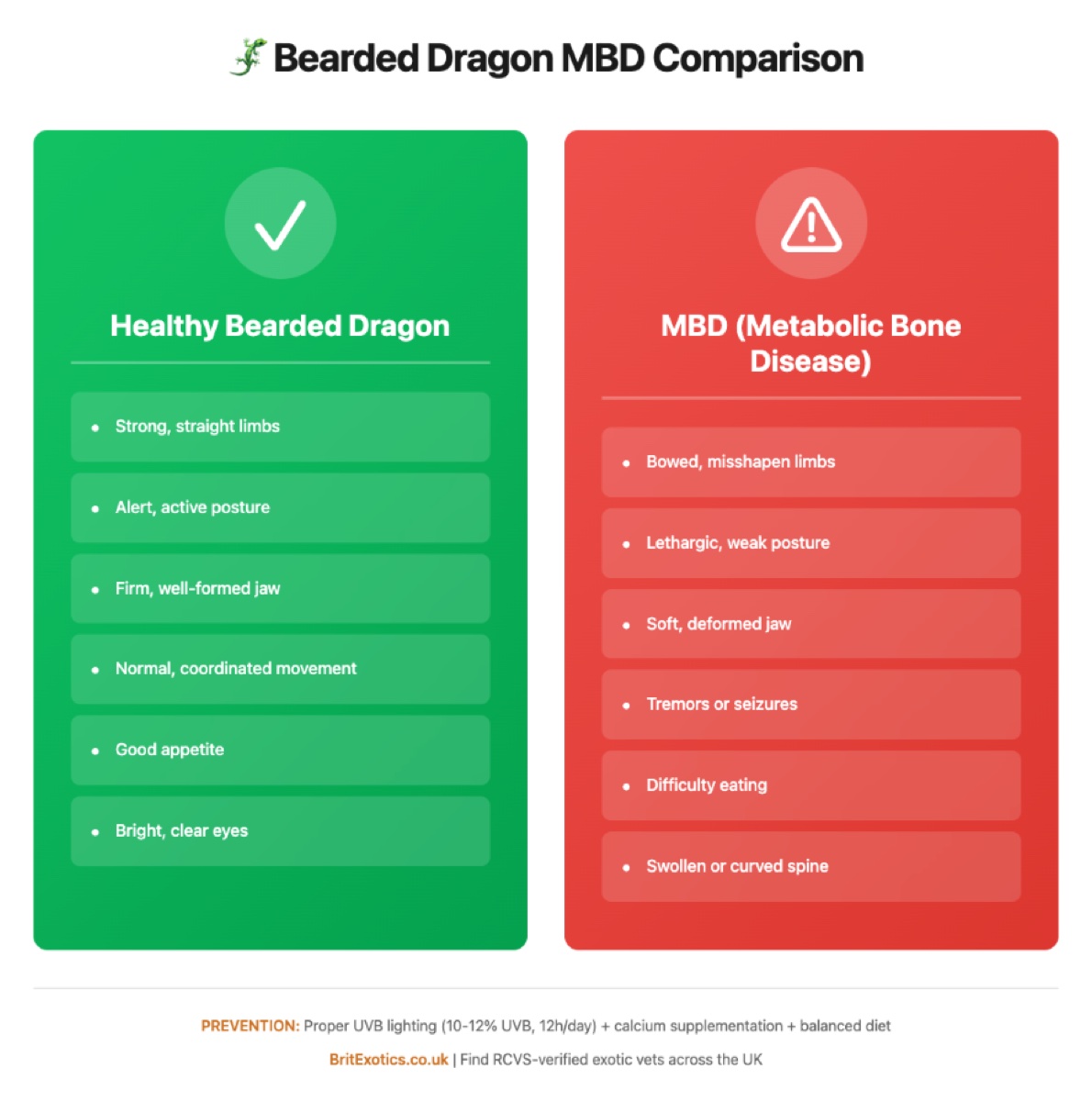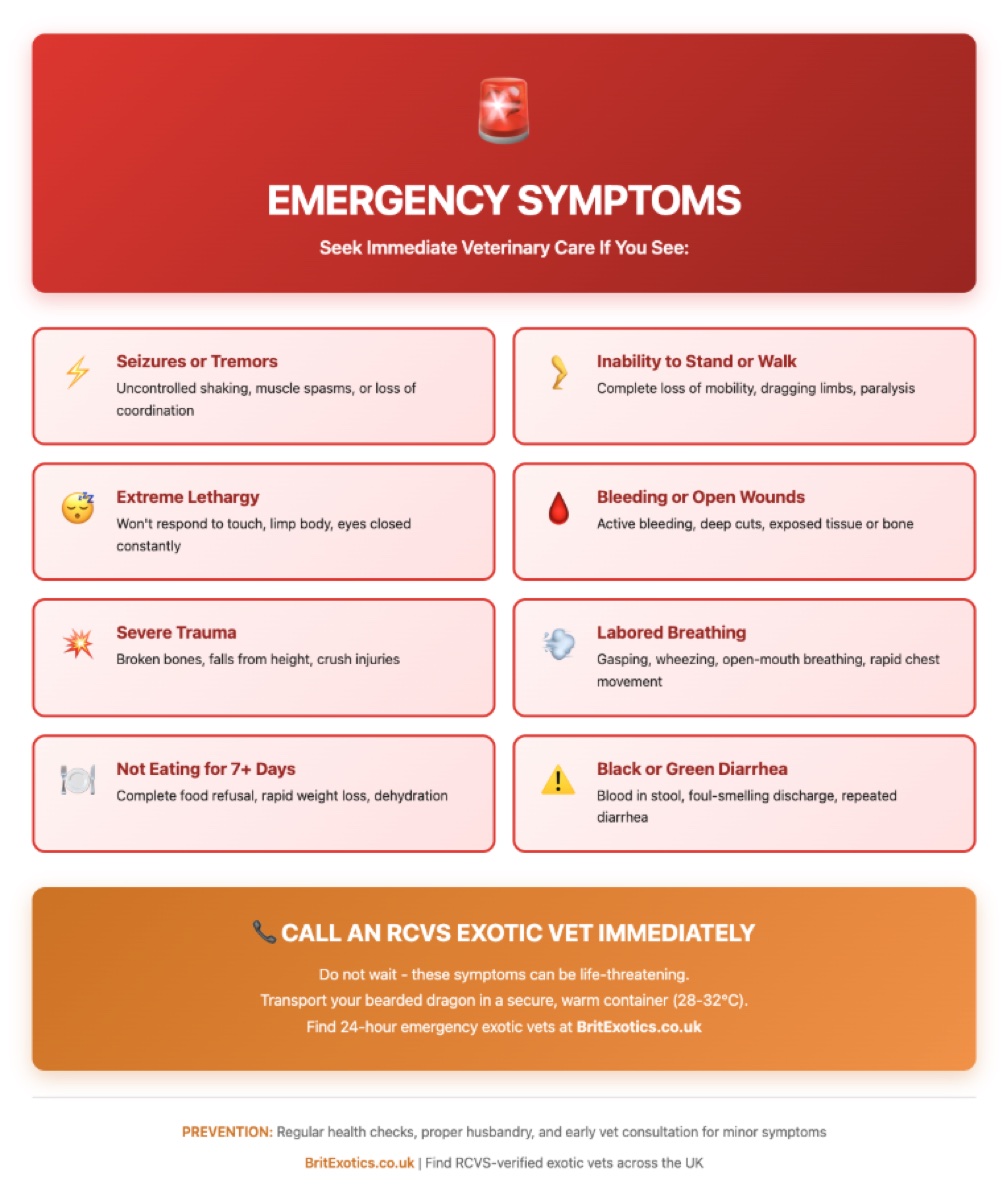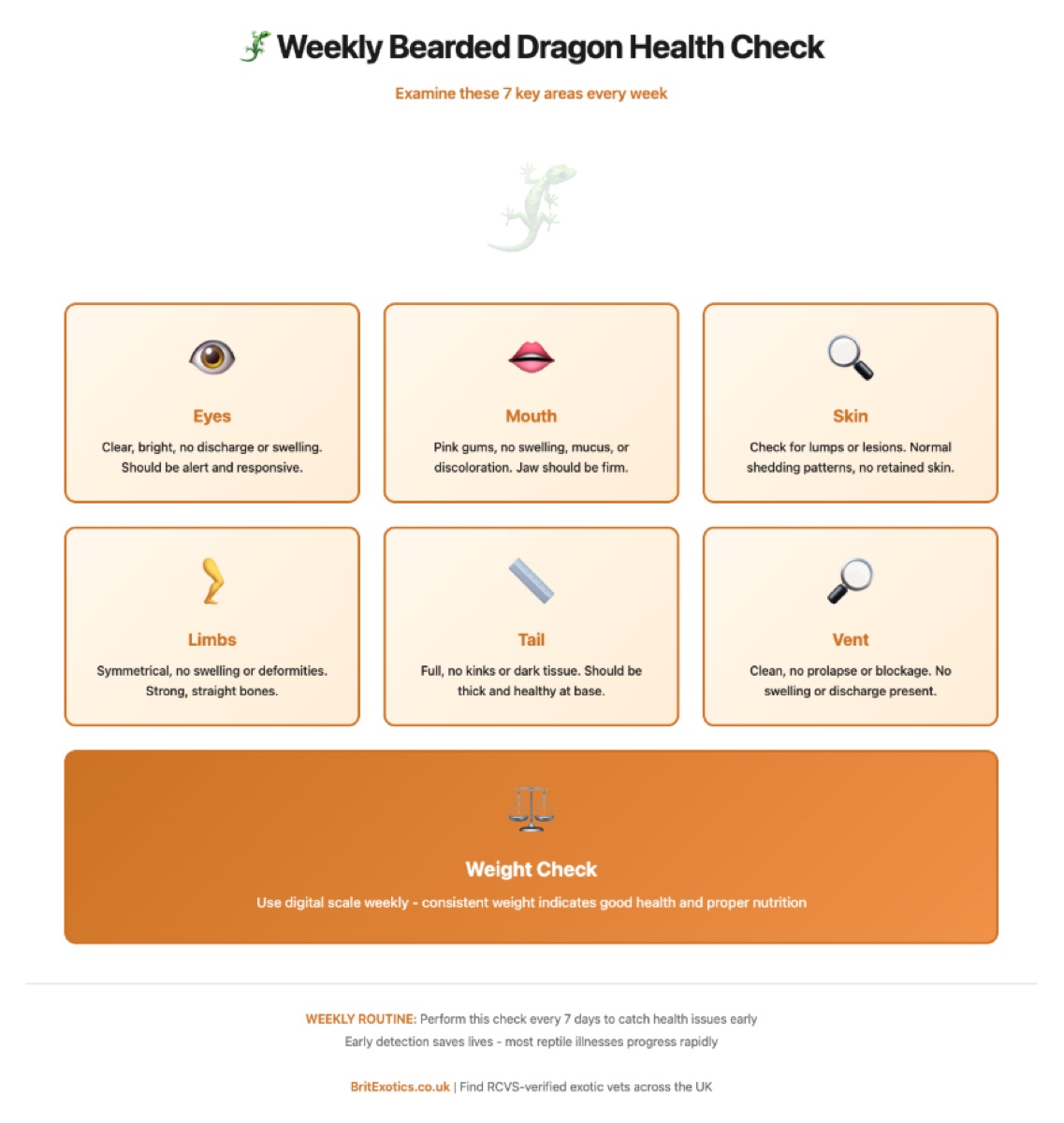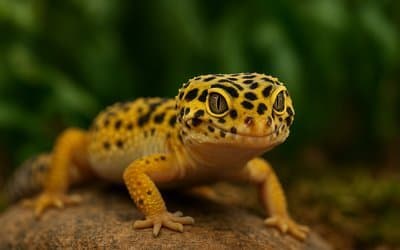Need expert help now? Find an RCVS-verified exotic vet near you.
Bearded dragons are among the UK's most popular exotic pets — calm, curious and full of personality. But without proper lighting, diet and temperature, even the healthiest dragon can develop serious illnesses.
This BritExotics guide explains the six most common bearded dragon health problems, how to spot early warning signs, what UK owners can do to prevent costly vet visits, and when to seek help from an RCVS-registered exotic vet.
Quick Answer
Most common issues: (1) MBD from insufficient UVB (irreversible if untreated), (2) Respiratory infections from UK cold/damp, (3) Impaction from substrate ingestion, (4) Parasites, (5) Stuck shed, (6) Tail/mouth rot. Prevention cost: £100-150/year. Treatment: £150-500+ per illness. Replace UVB tubes every 6-12 months, maintain 38-42°C basking temp, dust insects with calcium 3-5x weekly, annual RCVS vet checkup.
📋 Table of Contents
- 1. Metabolic Bone Disease (MBD)
- 2. Respiratory Infections
- 3. Impaction (Digestive Blockage)
- 4. Parasites (Internal & External)
- 5. Stuck Shed (Dysecdysis)
- 6. Tail Rot & Mouth Rot
- Emergency Symptoms
- Weekly Health Check Routine
- Essential Equipment (UK Links)
- Prevention vs Treatment Costs
- Frequently Asked Questions
1. Metabolic Bone Disease (MBD) — The Silent Killer
MBD occurs when bearded dragons fail to absorb enough calcium or vitamin D3. It is the most common and preventable reptile illness in the UK.

Causes
-
Insufficient UVB lighting (tubes degrade after 6-12 months)
-
Imbalanced diet (too many insects, not enough greens)
-
Lack of calcium or vitamin D3 supplementation
-
Incorrect basking temperature (prevents calcium absorption)
Symptoms
Early warning signs:
-
Lethargy and reduced activity
-
Tremors or muscle twitching
-
Difficulty walking or climbing
-
Loss of appetite
Advanced symptoms (irreversible):
-
Swollen or curved limbs
-
"Rubber jaw" (soft, flexible jawbone)
-
Paralysis of hind legs
-
Seizures
UK-Specific Prevention
-
UVB tubes: Replace every 6-12 months (output degrades even if bulb works)
-
Calcium powder: Dust insects 5x weekly for juveniles, 3x for adults
-
Natural sunlight: Safe in UK summer (June-August) but monitor temperature
-
Vitamin D3 supplement: Essential during low-light UK winters
Treatment
-
Vet visit IMMEDIATELY: MBD is irreversible once advanced
-
Calcium injections: Administered by RCVS exotic vet
-
Improved UVB: 10-12% tube at correct distance (30-40cm)
-
Dietary changes: Increase calcium-rich greens (collard, mustard, turnip greens)
Find an RCVS exotic vet near you →
2. Respiratory Infections (RI)
The UK's cold, damp climate makes respiratory infections a year-round risk for bearded dragons. Without proper heating and ventilation, even healthy dragons can develop serious lung issues.
Causes
-
UK climate issue: Cold, damp indoor conditions
-
Inadequate basking temperature (below 38°C)
-
Poor ventilation in glass vivarium
-
Substrate that's too moist
Symptoms
-
Gaping mouth (when NOT basking)
-
Mucus around nose or mouth
-
Wheezing, clicking, or labored breathing
-
Lethargy and loss of appetite
-
Puffing up while breathing
Prevention (UK Winter Focus)
-
Maintain basking spot: 38-42°C
-
Keep cool end: 24-26°C
-
Night temperature: Never below 18°C
-
Humidity: 30-40% (UK homes often too humid)
-
Increase ventilation in damp autumn/winter months
Treatment
Mild cases (early intervention):
-
Increase basking temperature by 2-3°C
-
Lower humidity to 30-35%
-
Monitor closely for 48 hours
Moderate to severe (VET REQUIRED):
-
Antibiotic treatment prescribed by vet
-
Nebulization therapy
-
Possible hospitalization
Do NOT delay — respiratory infections progress rapidly and can be fatal within days.
3. Impaction (Digestive Blockage)
Impaction occurs when a bearded dragon's digestive system becomes blocked, preventing normal bowel movements. It's a common UK issue, especially in dragons kept on loose substrates.
Causes
-
Ingesting loose substrate (sand, wood chips, walnut shell)
-
Prey items too large (wider than space between eyes)
-
Dehydration
-
Incorrect temperature (digestive system shuts down below 35°C)
Symptoms
-
No feces for 5+ days
-
Bloated, hard belly
-
Lethargy and weakness
-
Dragging hind legs
-
Complete loss of appetite
Prevention
-
Avoid loose substrates for juveniles (use tile, reptile carpet, or paper)
-
Prey size: No larger than space between eyes
-
Provide fresh water daily
-
Maintain proper basking temp (38-42°C) for digestion
Treatment
Home care (mild cases ONLY):
-
Warm baths (15 minutes daily in 30°C water)
-
Gentle belly massage (clockwise motion)
-
1-2 drops olive oil on food
Severe cases (EMERGENCY VET):
-
X-rays to confirm blockage location
-
Surgery to manually remove obstruction
-
Post-op care and recovery
Cost in UK: £200-500+ for surgical removal
4. Parasites (Internal & External)
Parasites are invisible threats that can severely impact your bearded dragon's health. Many UK dragons carry low-level parasites without symptoms — until their immune system weakens.
Common UK Parasites
-
Coccidia: Microscopic parasite causing bloody diarrhea
-
Pinworms: Very common, usually harmless in small numbers
-
Mites: Tiny external parasites (rare but serious if untreated)
Symptoms
Internal parasites:
-
Diarrhea or foul-smelling feces
-
Weight loss despite normal eating
-
Lethargy and dehydration
External parasites (mites):
-
Tiny black/red moving dots on skin
-
Frequent soaking behavior (trying to drown mites)
-
Skin irritation and restlessness
Prevention
-
Quarantine new reptiles for 30 days minimum
-
Buy only from reputable UK breeders (ask for health guarantee)
-
Annual fecal exam at RCVS exotic vet
-
Always wash hands after handling
Treatment
-
Fecal test: Required to identify parasite type
-
Antiparasitics: Prescribed by vet (e.g., Panacur for worms)
-
Deep clean: Disinfect entire enclosure with F10 or similar
-
Repeat treatment: Usually 2-3 rounds needed (14-21 days apart)
UK Vet Cost: £60-150 (including fecal test + medication)
5. Stuck Shed (Dysecdysis)
Shedding is natural, but stuck shed can become dangerous — especially on toes, tail tips, and eyes. The UK's dry indoor heating makes this a common winter problem.
Causes
-
Low humidity during shedding cycle (below 40%)
-
Dehydration
-
Nutritional deficiencies (vitamin A, protein)
-
Previous injury or scar tissue
High-Risk Areas
-
Toes: Constriction can cause loss of digits
-
Tail tip: Can necrotize (turn black and die)
-
Eyes: Retained eye caps (spectacle shed)
Prevention
-
Humid hide: Moist sphagnum moss in enclosed hide
-
Regular misting during shed cycle (2-3x daily)
-
Proper hydration (offer water daily)
-
Rough surfaces for rubbing (natural rock, branch)
Safe Home Treatment
-
Warm bath (30°C water, 15-20 minutes)
-
Gentle rubbing with soft toothbrush
-
Never pull stuck shed forcefully
-
Apply mineral oil to stubborn areas, wait 10 minutes, try again
When to See Vet
-
Stuck shed on toes for 48+ hours
-
Eye spectacle hasn't shed (causes blindness)
-
Multiple incomplete sheds in a row
-
Skin looks infected or inflamed
6. Tail Rot & Mouth Rot
Tail Rot (Necrosis)
Cause: Injury, stuck shed constricting blood flow, bacterial infection
Symptoms: Black/brown discoloration, dry or hard tail tip, foul smell
Treatment: Vet may need to amputate affected area to prevent spread
Mouth Rot (Infectious Stomatitis)
Cause: Bacterial infection, usually from mouth injury or poor hygiene
Symptoms: Swollen gums, yellow/white mucus, difficulty eating, drooling
Treatment: Antibiotic treatment from vet + daily mouth cleaning with diluted Betadine
⚠️ Both conditions require immediate veterinary care — do not attempt home treatment.
🚨 Emergency Situations — When to Call Vet IMMEDIATELY
These symptoms indicate life-threatening conditions. Contact an RCVS exotic vet or 24/7 emergency clinic NOW:
-
Seizures or convulsions
-
Unresponsive or completely limp
-
Severe bleeding that won't stop
-
Prolapsed organ (pink tissue protruding from vent)
-
Suspected toxin ingestion (plants, chemicals)
-
Not breathing normally (gasping, choking)
-
Severe trauma (fall, bite, crush injury)
Find 24/7 emergency exotic vets near you →

Weekly Health Check Routine
Early detection is key. Perform this 5-minute check every week:
✅ Physical Inspection
-
Eyes: Clear, alert, no discharge or cloudiness
-
Mouth: Pink gums, no swelling or mucus
-
Skin: Smooth, no lumps, lesions, or discoloration
-
Vent: Clean, no swelling or prolapse
-
Limbs: Straight, equal strength, no tremors
-
Tail: Firm, full, no dark spots or constriction
✅ Behavior Check
-
Active during basking hours (morning/afternoon)
-
Regular appetite (eating 10-20 insects or greens daily)
-
Alert and responsive to movement
-
Normal defecation pattern (every 1-4 days)
✅ Weight Monitoring
-
Weigh monthly (digital kitchen scale)
-
Sudden loss of >10% body weight = vet visit
-
Healthy adult weight: 350-600g (varies by size/age)

Finding an Exotic Vet in the UK
Not all vets treat reptiles. Before you need emergency care:
-
Verify RCVS exotic certification (search RCVS Find a Vet tool)
-
Call ahead: Confirm they see bearded dragons regularly
-
Save contact info: Include out-of-hours emergency number
-
Know location: How far to drive in an emergency?
Browse RCVS-registered exotic vets by city →
Essential Health Monitoring Equipment (UK)
UVB & Calcium Supplements
-
🛒 Arcadia T5 UVB 12% Tube (10-12%) — Replace every 12 months
-
🛒 Calcium + D3 Powder — Dust insects 3-5x weekly
-
🛒 Reptile Multivitamin — Once weekly
Temperature & Humidity Monitoring
-
🛒 Digital Thermometer/Hygrometer Combo — Monitor both ends of vivarium
-
🛒 Infrared Temperature Gun — Verify basking spot is 38-42°C
-
🛒 Habistat Pulse Thermostat — Prevent overheating
Health & Cleaning Supplies
-
🛒 Digital Kitchen Scale — Monthly weight tracking
-
🛒 F10 Veterinary Disinfectant — Deep cleaning (parasites, infections)
-
🛒 Sphagnum Moss — Humid hide for shedding
-
🛒 Reptile Saline Eye Drops — Stuck eye caps (vet-approved only)
Total essential health kit: £80-150 (prevents £500+ in vet bills)
Prevention is Cheaper Than Treatment
UK exotic vet costs (2025 estimates):
-
Consultation: £40-80
-
X-rays: £80-150
-
Blood tests: £60-100
-
Surgery (impaction, tail amputation): £200-500+
-
Hospitalization: £50-150 per day
Invest in prevention instead:
-
Quality UVB tube (10-12%): £30-50 (lasts 12 months)
-
Calcium + D3 supplement: £8-15 (lasts 6+ months)
-
Digital thermometer/hygrometer: £10-20
-
Annual vet checkup: £40-60
Total annual prevention cost: ~£100-150
Average treatment cost for one illness: £150-500+
Bearded Dragon Lifespan in the UK
Properly cared for: 10-15 years
Poor care (no UVB, bad diet, no vet visits): 3-5 years
The difference? Consistent preventive care and early intervention when problems arise.
Frequently Asked Questions
What are the most common bearded dragon health problems in the UK?
The 6 most common issues are: (1) Metabolic Bone Disease (MBD) from insufficient UVB, (2) Respiratory infections from cold UK climate, (3) Impaction from substrate ingestion, (4) Parasites (internal/external), (5) Stuck shed from low humidity, and (6) Tail/mouth rot from infections. MBD is the #1 preventable killer.
How do I know if my bearded dragon has MBD?
Early MBD symptoms include lethargy, tremors, difficulty walking, and loss of appetite. Advanced signs are swollen/curved limbs, 'rubber jaw' (soft jawbone), paralysis, and seizures. Once advanced, MBD is irreversible. Replace UVB tubes every 6-12 months and dust insects with calcium powder 3-5x weekly.
When should I take my bearded dragon to a vet in the UK?
Seek RCVS exotic vet care immediately for: seizures, unresponsiveness, severe bleeding, prolapsed organs, breathing difficulty, or trauma. Also visit vet for: MBD symptoms, respiratory infection (mucus, wheezing), no feces for 5+ days (impaction), or stuck shed on toes/eyes for 48+ hours.
How much does a bearded dragon vet visit cost in the UK?
UK exotic vet costs (2025): Consultation £40-80, X-rays £80-150, blood tests £60-100, surgery (impaction/amputation) £200-500+, hospitalization £50-150/day. Annual preventive care (UVB tube, calcium, checkup) costs only £100-150 vs £150-500+ for treating one illness.
How can I prevent respiratory infections in UK bearded dragons?
UK climate makes respiratory infections common. Prevent by maintaining: basking spot 38-42°C, cool end 24-26°C, night temperature never below 18°C, humidity 30-40% (UK homes often too humid). Increase ventilation in damp autumn/winter. If you see gaping mouth (when not basking), mucus, or wheezing, increase basking temp by 2-3°C and monitor for 48 hours.
What UVB lighting do bearded dragons need in the UK?
Use 10-12% UVB tube (not compact bulb) positioned 30-40cm from basking spot. Replace every 6-12 months even if bulb still works (UV output degrades). UK winter months (Nov-Feb) require vitamin D3 supplementation due to low natural sunlight. Safe to use natural UK summer sun (June-Aug) but monitor temperature.
Related Resources
Have concerns about your bearded dragon's health? Don't wait — consult an RCVS exotic vet today.
This guide was reviewed by Dr. Alex R., MRCVS (Member of the Royal College of Veterinary Surgeons) and reflects current UK veterinary best practices for bearded dragon care.
Frequently Asked Questions
What are the most common bearded dragon health problems in the UK?
How do I know if my bearded dragon has MBD?
When should I take my bearded dragon to a vet in the UK?
How much does a bearded dragon vet visit cost in the UK?
How can I prevent respiratory infections in UK bearded dragons?
What UVB lighting do bearded dragons need in the UK?
What diseases can bearded dragons get?
How can I tell if my bearded dragon is sick?
Need a specialist exotic vet?
Find RCVS-Verified Exotic Vets Near YouFind Exotic Vets & Resources

Want more expert tips like this?
Download your free Exotic Pet Starter Guide and make sure your setup is right from day one.
Related Guides
Written by: BritExotics Editorial Team
Updated October 15, 2025
